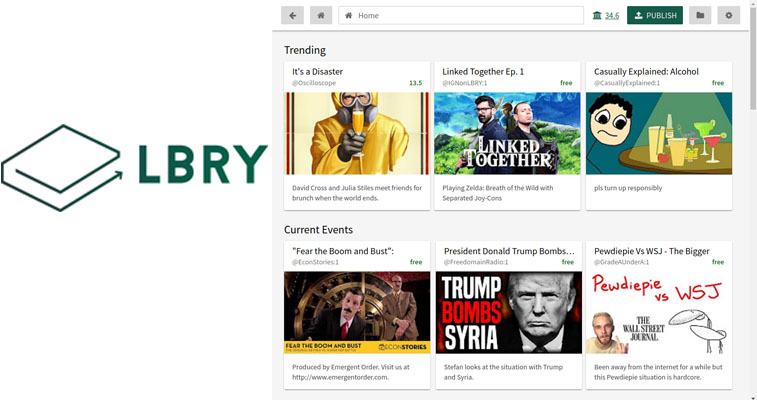YouTube is a juggernaut. They are, without question, the video sharing platform for content creators. However, many top creators are finding huge drops in views and, in turn, are receiving less money.
Some YouTubers have started switching distributors, such as Vidme or Vimeo, but find those platforms do not have the massive install base and monetization capabilities YouTube has. What about other types of content such as written work or music? For many creators, it can feel like throwing a published work into an ocean full of other content, all looking to get to the surface.
Enter LBRY (pronounced “library”), a Manchester, NH-based startup looking to change the way digital content creators share their work. LBRY sets itself apart from other distribution platforms by utilizing blockchain technology.

The LBRY protocol can be downloaded onto a user’s Internet browser. Then, the user can look through LBRY’s collection of content. The content itself can be purchased for download through the company’s own cryptocurrency, LBRY Credits. The software is also open source, where any user can create and input their own APIs. The open source community has grown to include over 100 contributors to the project.
The company is the brainchild of Jeremy Kauffman, Josh Finer, Jack Robison, and Jimmy Kiselak. Kauffman was an early adopter of Bitcoin back in 2013, after a friend introduced him to the cryptocurrency. After becoming more entrenched in the culture surrounding it, Kauffman became more interested in some of the other aspects of cryptocurrency.

“I was reading a conversation between [Alphabet Executive Chairman] Eric Schmidt and Julian Assange about the applications of Bitcoin to information distribution,” Kauffman said. “What made me interested in learning more about it was the fact that it was decentralized. I began asking myself ‘What other things can be decentralized?’”
While the protocol works for any kind of media or digital content, the current focus of LBRY is on video.
“At first, we didn’t realize how frustrated YouTubers were frustrated with the current system,” the CEO said. “We also had no idea how bad it was becoming. With LBRY, we want to fix these problems.”
“Taking on a giant like YouTube may seem overambitious, but with decentralized technology, there is potential to shake things up, ” Kauffman adds.
While the company is still scaling, several popular YouTubers have become clients of the company, including Casually Explained.
Last summer, LBRY had a booth set up at the Porcupine Freedom Festival, where they showcased the video streaming quality and how their blockchain-inspired technology for the cryptocurrency crowd.
“We were able to stream the first Hollywood film via blockchain,” he said. “A lot of the festival goers were stopping in their tracks to see what we were doing.”
Video streaming is not the only form of content LBRY can distribute; the company supports content of all types, including pictures, written work, and music.
“We even host our own content. I have experience putting some white text on an image and creating memes,” Kauffman said with a laugh. “It’s not exactly high-quality content, but we are users of our own protocol.”
Last month, LBRY entered an open beta, and any first-time user can download the protocol and receive LBRY credits of their own.

Cryptocurrency and blockchain is no longer just an underground movement. Many entrepreneurs and investors in the Boston tech scene are taking a closer look at it, and what it could possibly do for the future.
For digital content creators, knowing there is a startup like LBRY utilizing this type of technology is eye-opening. On top of being part of a new and developing tech sector, LBRY could potentially spearhead a new way to distributing content.
Colin Barry is a contributor to VentureFizz. Follow him on Twitter @ColinKrash.

